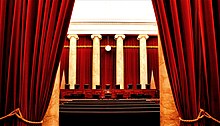Lobbying




Lobbying, persuasion, or interest representation is the act of attempting to influence the actions, policies, or decisions of officials in their daily life, most often legislators or members of regulatory agencies. Lobbying is done by many types of people, associations and organized groups, including individuals in the private sector, corporations, fellow legislators or government officials, or advocacy groups (interest groups). Lobbyists may be among a legislator's constituencies, meaning a voter or bloc of voters within their electoral district, or not; they may engage in lobbying as a business. Professional lobbyists are people whose business is trying to influence legislation, regulation, or other government decisions, actions, or policies on behalf of a group or individual who hires them. Individuals and nonprofit organizations can also lobby as an act of volunteering or as a small part of their normal job (for instance, a CEO meeting with a representative about a project important to their company, or an activist meeting with their legislator in an unpaid capacity). Governments often define and regulate organized group lobbying that has become influential.
The ethics and morality of lobbying are dual-edged. Lobbying is often spoken of with contempt, when the implication is that people with inordinate socioeconomic power are corrupting the law (twisting it away from fairness) in order to serve their own interests. When people who have a duty to act on behalf of others, such as elected officials with a duty to serve their constituents' interests or more broadly the public good, can benefit by shaping the law to serve the interests of some private parties, a conflict of interest exists. Many critiques of lobbying point to the potential for conflicts of interest to lead to agent misdirection or the intentional failure of an agent with a duty to serve an employer, client, or constituent to perform those duties. The failure of government officials to serve the public interest as a consequence of lobbying by special interests who provide benefits to the official is an example of agent misdirection.
Quotes
[edit]- Though the pie to be shared by the next generation will be far larger than today’s, how it will be divided will remain fiercely contentious. Just as is now the case, there will be struggles for the increased output of goods and services between those people in their productive years and retirees, between the healthy and the infirm, between the inheritors and the Horatio Algers, between investors and workers and, in particular, between those with talents that are valued highly by the marketplace and the equally decent hard-working Americans who lack the skills the market prizes. Clashes of that sort have forever been with us – and will forever continue. Congress will be the battlefield; money and votes will be the weapons. Lobbying will remain a growth industry.
- Warren Buffett, Chairman's Letter - 2015. Berkshire Hathaway (February 27, 2016).
- Private capital tends to become concentrated in few hands, partly because of competition among the capitalists, and partly because technological development and the increasing division of labor encourage the formation of larger units of production at the expense of smaller ones. The result of these developments is an oligarchy of private capital the enormous power of which cannot be effectively checked even by a democratically organized political society. This is true since the members of legislative bodies are selected by political parties, largely financed or otherwise influenced by private capitalists who, for all practical purposes, separate the electorate from the legislature. The consequence is that the representatives of the people do not in fact sufficiently protect the interests of the underprivileged sections of the population. Moreover, under existing conditions, private capitalists inevitably control, directly or indirectly, the main sources of information (press, radio, education). It is thus extremely difficult, and indeed in most cases quite impossible, for the individual citizen to come to objective conclusions and to make intelligent use of his political rights.
- Albert Einstein, Why Socialism? (1949)
- There are a lot of guys on both campaigns, on all the campaigns now, who do some very questionable lobbying on behalf of very questionable interests and do things that trouble me a whole lot more than a woman writing a book about masturbation.
- Susan Estrich, Hannity & Colmes (November 2, 1999).
- שָׂרַ֣יִךְ סֹורְרִ֗ים וְחַבְרֵי֙ גַּנָּבִ֔ים כֻּלֹּו֙ אֹהֵ֣ב שֹׁ֔חַד וְרֹדֵ֖ף שַׁלְמֹנִ֑ים יָתֹום֙ לֹ֣א יִשְׁפֹּ֔טוּ וְרִ֥יב אַלְמָנָ֖ה לֹֽא־יָבֹ֥וא אֲלֵיהֶֽם׃ פ
- Isaiah 1:23, Leningrad Codex.
- Your rulers are rebels,
partners with thieves;
they all love bribes and chase after gifts.
They do not defend the cause of the fatherless;
the widow’s case does not come before them. - NIV
- Your rulers are rebels and friends of thieves.
They demand bribes and accept money for doing wrong.
They take money to cheat people, and they don’t speak up for widows and orphans.
They will not even listen to their cries for help. - Easy-to-Read Version
- Your leaders are turncoats
who keep company with crooks.
They sell themselves to the highest bidder
and grab anything not nailed down.
They never stand up for the homeless,
never stick up for the defenseless. - The Message
- When Bobby Kennedy went after organized crime in the early 1960s, one of the things he learned was that the Mafia had a series of rituals new members went through to declare their loyalty and promise they’d never turn away from their new benefactors. Once in, they’d be showered with money and protection, but they could never leave and even faced serious problems if they betrayed the syndicate. Which brings us to the story of Kyrsten Sinema. For a republican democracy to actually work, average citizens with a passion for making their country better must be able to run for public office without needing wealthy or powerful patrons; this is a concept that dates back to Aristotle’s rants on the topic. And Sinema... Apparently... she decided that if you can only barely beat them, you’d damn well better join them. Sinema quickly joined other Democrats who’d followed the Citizens United path to the flashing neon lights of big money, joining the so-called “Problem Solvers” caucus that owes its existence in part to the Wall Street-funded front group “No Labels.” ... Political networks run by rightwing billionaires and the US Chamber of Commerce showered her with support... She’d proved herself as a “made woman,” just like the old mafiosi documented by RFK in the 1960s, willing to do whatever it takes, compromise whatever principles she espoused...
- Thom Hartmann in Krysten Sinema is the Epitome of Political Corruption, Thom Hartmann, CounterPunch, October 14, 2021
- And this is a genuine crisis for America because if President Biden is frustrated in his attempt to pass his Build Back Better legislation (that is overwhelmingly supported by Americans across the political spectrum) — all because business groups, giant corporations and rightwing billionaires are asserting ownership over their two “made” senators — there’s a very good chance that today’s cynicism and political violence is just a preview of the rest of the decade. But this isn’t as much a story about Sinema as it is about today’s larger political dysfunction for which she’s become, along with Joe Manchin, a poster child. Increasingly, because of the Supreme Court’s betrayal of American values, it’s become impossible for people like the younger Sinema to rise from social worker to the United States Senate without big money behind them.... While the naked corruption of Sinema and Joe Manchin is a source of outrage for Democrats across America, what’s far more important is that it reveals how deep the rot of money in American politics has gone, thanks entirely to a corrupted Supreme Court. In Justice Stevens’ dissent in Citizens United, he pointed out that corporations in their modern form didn’t even exist when the Constitution was written...
- Thom Hartmann in Krysten Sinema is the Epitome of Political Corruption, Thom Hartmann, CounterPunch, October 14, 2021
- Lobbyists are in many cases expert technicians and capable of explaining complex and difficult subjects in a clear, understandable fashion. They engage in personal discussions with Members of Congress in which they can explain in detail the reasons for positions they advocate…. Because our congressional representation is based on geographical boundaries, the lobbyists who speak for the various economic, commercial, and other functional interests of this country serve a very useful purpose and have assumed an important role in the legislative process.
- John F. Kennedy, "To Keep the Lobbyist Within Bounds", The New York Times Magazine (February 19, 1956); reported in Congressional Record (March 2, 1956), vol. 102, p. 3802–3.
- If any of the great corporations of the country were to hire adventurers who make market of themselves in this way, to procure the passage of a general law with a view to the promotion of their private interests, the moral sense of every right-minded man would instinctively denounce the employer and employed as steeped in corruption, and the employment as infamous.
- United States Supreme Court opinion, Trist v. Child, 1874, cited in David Cole, "How Corrupt Are Our Politics?" New York Review of Books, September 25, 2014
- We hear much of special interest groups. Our concern must be for a special interest group that has been too long neglected. It knows no sectional boundaries or ethnic and racial divisions, and it crosses political party lines. It is made up of men and women who raise our food, patrol our streets, man our mines and our factories, teach our children, keep our homes, and heal us when we are sick—professionals, industrialists, shopkeepers, clerks, cabbies, and truck drivers. They are, in short, “We the people,” this breed called Americans.
- Ronald Reagan, "First Inaugural Address," 1981



